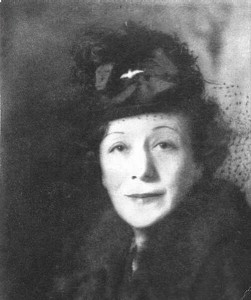From My Bookshelf: The Memoirs of Vera Weizmann

Earlier this year I was lucky enough to participate in a seminar that gave me a better understanding of the history and philosophies (note the plural) behind Zionism. Through the class, I also developed a much deeper appreciation and respect for so many heroes in the story of Zionism, including Chaim Weizmann. And I heard (or read) enough about Dr. Weizmann’s wife, Vera (who was also “Dr. Weizmann” – which is especially impressive when one recalls that Vera was born in Russia in 1881!) to make me want to learn more about her.
So, recently, I picked up a copy of The Impossible Takes Longer: The Memoirs of Vera Weizmann as told to David Tutaev. The book was published by Harper & Row in 1967, shortly after Vera Weizmann’s death.
Frankly, I need (and want) to read it again. It is wonderfully detailed and I want to be sure that I caught everything. For now, though, I thought I’d simply share a few choice morsels from the memoir:
“I do not propose to write about the Paris Peace Conference [after World War I] or my husband’s part in it–he has written his own account of what happened. But one episode which he recounted to me stays in my memory. To his intense surprise, Baron Edmond de Rothschild, whom he knew to be a good Zionist, had nominated Professor Sylvain Lévi as one of the Jewish representatives at the peace conference. Lévi’s lukewarm, even hostile, attitude towards Zionism had been clearly apparent when he was serving as a member of the Zionist Commission in Palestine early in 1918, and at the peace conference he excelled himself in creating as many obstacles as possible. The spectacle of Jewish representatives arguing among themselves would not be particularly edifying, thought Chaim. So when the American Secretary of State, Mr. Lansing, to save the situation, asked Chaim to define what he meant by ‘a Jewish national homeland,’ my husband replied, ‘I think Palestine should be as Jewish as England is English, France is French, and America is American’. At the close of this session, Balfour sent his secretary to congratulate Chaim: but when Lévi came up to Chaim and held out his hand, my husband refused to shake it.” (p. 95; emphasis mine)
==========
“I can think no more poignant prophecy was ever uttered in our times than the statement which [Chaim Weizmann] made to the Peel Commission in Jerusalem in 1937. This is what he said:
Six million Jews are pent up in places where they are not wanted; and for them the world is divided into places where they cannot live and places which they may not enter. For these people a certificate for Palestine is the highest book. One in twenty, one in thirty may get in, and for them it is redemption.
As the ghastly events in Europe during the Second World War were to show, this was more than a bitter prophecy: it was an epitaph over the grave of European Jewry.” (p. 127)
==========
“[I]n November 1951 Chaim had evidently written to congratulate him on his birthday: Churchill had been born in the same year as Chaim (1874), and only three days later. Churchill answered saying:
Thank you very much for your letter and good wishes. The wonderful exertions which Israel is making in these times of difficulty are cheering to an old Zionist like me. I trust you may work in with Jordan and the rest of the Moslem world. With true comradeship, there will be enough for all. Every good wish, my old friend.
There was nothing in these sentiments with which either Chaim or I could disagree but, despite many Israel overtures, the Arab world continued its propaganda war against our State.” (p. 249)
==========
On my next trip to Israel, I hope to visit Weizmann House in Rehovot. Have any of you seen it?